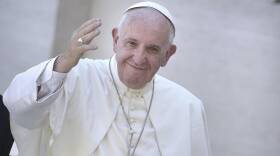Trump may abandon Ukraine peace talks 'within days,' Rubio warns
Secretary of State Marco Rubio said Friday that the U.S. would walk away from efforts to broker a ceasefire between Russia and Ukraine if progress isn't made within days.
-
Pope Francis is released from the hospital
Pope Francis was released from the hospital in Rome where he's been held since mid February. -
From his hospital bed, Pope Francis stays in touch with Catholic parishioners in Gaza
Even while Pope Francis is hospitalized, he still keeps in touch with a Roman Catholic parish in Gaza City, making near-nightly phone calls to the priest and congregation there. -
An ancient Roman basilica has been discovered below London's financial district
The basilica, dating back some 1,900 years, was found during excavations that took place as part of the demolition of a building in the heart of London. -
John Bolton on expanding into Greenland
John Bolton, Trump's former national security adviser, says making Greenland an American territory or commonwealth could help with security interests of "critical importance" to the United States. -
China no longer has a de minimis trade exemption. What is it?
The trade loophole is meant to ease small-scale sales — but critics say it's been abused and gives Chinese firms an unfair advantage. -
An asteroid may hit Earth in 8 years — but don't panic
"It's not that big," says Sky & Telescope editor Kelly Beatty. -
Trump says he wants the U.S. to take ownership of the Gaza Strip
Trump said he and Israeli leader Benjamin Netanyahu talked Tuesday about relocating Palestinians and leveling Gaza, which he suggested could be the "Riviera of the Middle East" under U.S. ownership. -
Why does Musk want USAID 'to die'? And why did its website disappear?
Under the Trump administration, the U.S. agency that funds aid projects has faced layoffs, a stop action order for most aid efforts and a disruption of its website. Now Elon Musk says it should 'die.'











